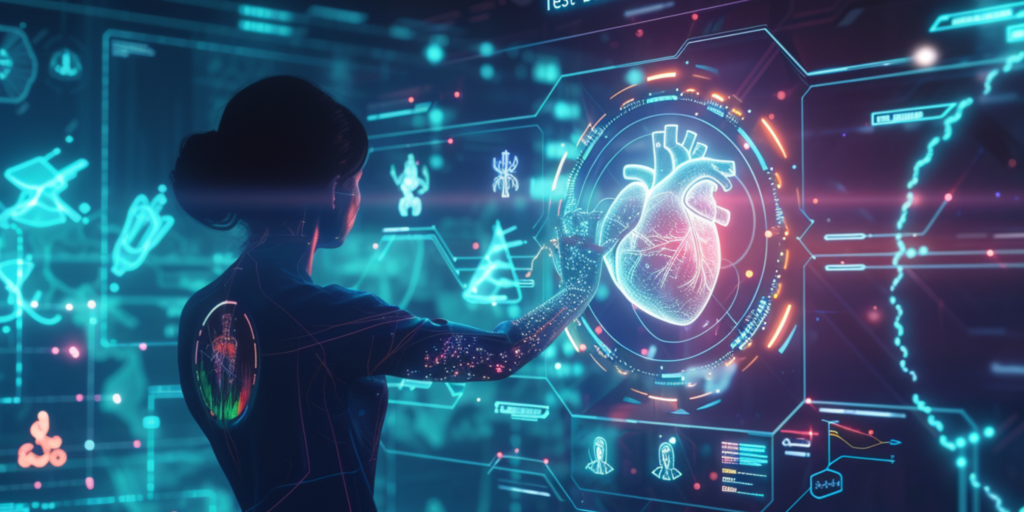Groundbreaking collaboration emerges between Google and Apollo Radiology International, marking a pivotal moment for the medical industry in India.
This partnership signifies a bold step forward in harnessing the transformative power of Artificial Intelligence to revolutionize early disease detection, potentially saving millions of lives.
As the world anticipates the insights from the Google Health Global Check Up event, the discussions with Dr. Sreenivasa Raju Kalidindi, CEO and Medical Director of Apollo Radiology International, alongside Shravya Shetty, Director & Engineering Lead at Google Health AI Research, shed light on the profound impact and promising future of AI in healthcare.
This introduction sets the stage for a deeper exploration into the significance of this collaboration, the challenges it aims to address, and the hopeful horizon it presents for enhancing healthcare outcomes across India.
Addressing Healthcare Challenges
AI technologies, through machine learning algorithms and deep learning networks, can identify patterns and anomalies within complex medical data that might be imperceptible to the human eye. This capability is particularly transformative in fields like radiology, where the demand for accurate interpretation of medical images is ever-increasing.
AI-powered tools can assist radiologists in detecting early signs of diseases such as cancer, cardiovascular anomalies, and neurological conditions with greater accuracy and speed. This not only helps in early intervention but also reduces the workload on healthcare professionals, allowing them to focus on critical care and decision-making.
Early detection of diseases such as tuberculosis, lung cancer, and breast cancer can dramatically improve treatment outcomes and survival rates. In regions with a high burden of disease and a shortage of specialized healthcare professionals, AI can play a critical role in bridging the gap.
By analyzing medical images like chest X-rays and mammograms, AI systems can help in identifying early signs of these diseases, facilitating timely treatment and saving lives.
This is particularly important in countries like India, where the accessibility and affordability of healthcare remain significant challenges. The scarcity of trained radiologists and the centralized nature of medical expertise are significant barriers to healthcare access in many parts of the world.
AI has the potential to democratize access to diagnostic services, making it possible for patients in remote and underserved areas to receive expert-level screening and diagnosis. By integrating AI-powered diagnostic tools into the healthcare infrastructure, it is possible to extend the reach of specialist medical care to those who need it most, reducing disparities in healthcare access.
Beyond diagnostics, AI is instrumental in enhancing the operational aspects of healthcare delivery. From automating administrative tasks to optimizing patient flow and managing resources more effectively, AI can contribute to a more efficient and patient-centric healthcare system.
By reducing the time and resources spent on routine tasks, healthcare providers can allocate more focus on patient care and improve the overall patient experience.

Addressing Challenges with AI
Many regions around the world, particularly in developing countries, face acute shortages of trained healthcare professionals, including radiologists. This shortage limits the capacity for early diagnosis and treatment, especially in remote areas.
AI-powered diagnostic tools can partially offset this gap by providing support for preliminary screenings and diagnoses, thus amplifying the reach and efficiency of the available medical workforce.
For example, AI algorithms can analyze X-rays and MRI scans to detect abnormalities such as fractures, tumours, and signs of diseases like tuberculosis, often with accuracy that rivals or surpasses that of human specialists.
One of the most significant contributions of AI in healthcare is its ability to improve disease detection and diagnosis. AI systems are trained on vast datasets, enabling them to recognize patterns and anomalies that may be indicative of specific health conditions.
This is particularly valuable for the early detection of diseases such as breast cancer, lung cancer, and cardiovascular diseases, where early intervention can dramatically improve treatment outcomes. By analyzing imaging data, AI can identify potential issues sooner and with higher precision, facilitating timely and accurate diagnoses.
AI has the potential to democratize access to specialized medical care by making diagnostic services more widely available, regardless of geographical location.
Through telemedicine platforms integrated with AI diagnostic tools, patients in underserved areas can receive expert-level consultations and screenings.
This not only broadens the accessibility of high-quality healthcare but also helps in reducing health disparities between urban and rural populations. Beyond direct patient care, AI is transforming healthcare operations, making them more efficient and patient-friendly.
From scheduling appointments to managing patient flows and predicting peak times in hospitals, AI-driven analytics help optimize resources and reduce waiting times.
AI can play a crucial role in managing health records, enabling more accurate and faster processing of patient information, which in turn supports better health outcomes. AI’s ability to process and analyze vast amounts of data extends to genetic information, which can be used to tailor treatments to individual patients.
This aspect of AI is critical in the development of personalized medicine, where treatments and interventions are optimized based on the patient’s genetic makeup, lifestyle, and other factors.
Personalized medicine promises to enhance the efficacy of treatments and minimize side effects, leading to better patient care and satisfaction. Despite its potential, the adoption of AI in healthcare comes with its set of challenges, including scepticism from medical professionals, ethical concerns, data privacy issues, and the need for robust regulatory frameworks.
Addressing these challenges requires continuous dialogue between technology developers, healthcare providers, policymakers, and patients to ensure that AI tools are reliable and ethical and enhance the healthcare experience without compromising patient safety or privacy.

The Role of AI
One of the most critical applications of AI in healthcare is in improving the accuracy of diagnoses. AI algorithms, trained on vast datasets of medical images and health records, can detect subtle patterns and anomalies that may be indicative of disease.
This capability is particularly valuable in diagnosing conditions that are difficult for the human eye to catch, such as early-stage cancers. By enabling earlier and more accurate diagnoses, AI can significantly improve treatment outcomes, as many conditions are far more manageable when detected early.
AI technologies are at the forefront of enabling personalized medicine, where treatment plans are tailored to the individual characteristics of each patient, including their genetic makeup, lifestyle, and response to previous treatments.
By analyzing these factors, AI can help predict how different patients will respond to various treatments, allowing healthcare providers to choose the most effective course of action for each individual.
This approach not only improves patient outcomes but also reduces the likelihood of adverse reactions and unnecessary treatments. AI-driven tools are making healthcare delivery more efficient by automating administrative tasks, optimizing scheduling, and managing patient flow.
These improvements help reduce wait times, increase the capacity for patient care, and lower the risk of errors. AI systems can predict patient admission rates and identify potential bottlenecks in healthcare services, enabling hospitals and clinics to allocate resources more effectively and improve the overall patient experience.
Through wearable devices and mobile health applications integrated with AI, patients can be monitored remotely, providing real-time data on vital signs, physical activity, and other health indicators.
This capability allows for early detection of potential health issues and adjustments in treatment plans without the need for hospital visits.
Remote monitoring is particularly beneficial for managing chronic conditions, such as diabetes and heart disease, and improving patient outcomes through continuous care and intervention.
AI is accelerating the pace of medical research and drug development by analyzing vast amounts of data to identify potential therapeutic targets and predict the effectiveness of new drugs.
This not only speeds up the discovery process but also increases the likelihood of success in developing treatments for complex diseases. AI can assist in designing clinical trials, identifying suitable candidates, and monitoring outcomes, thereby improving the efficiency and effectiveness of research efforts.
While the potential of AI in healthcare is immense, its successful implementation faces several challenges, including data privacy concerns, the need for robust regulatory frameworks, and the integration of AI tools into existing healthcare practices.
Addressing these challenges requires collaborative efforts among technologists, healthcare professionals, policymakers, and patients to ensure that AI technologies are used ethically, responsibly, and effectively.
The Significance of Partnerships
AI development in healthcare requires a multidisciplinary approach, combining the technical prowess of AI researchers and developers with the clinical expertise of healthcare professionals.
Partnerships facilitate the exchange of knowledge, allowing for the development of AI models that are not only technically advanced but also clinically relevant and accurate.
By working together, tech companies and healthcare organizations can ensure that AI tools are designed to meet the real needs of patients and clinicians, thereby enhancing their adoption and impact.
The journey from AI research to clinical application involves navigating regulatory approvals, conducting clinical trials, and ensuring the integration of AI tools into existing healthcare workflows.
Partnerships with healthcare institutions provide a pathway for real-world testing and validation, crucial steps in demonstrating the efficacy and safety of AI applications in medical settings.
These collaborations help bridge the gap between innovation and practical application, speeding up the process of bringing AI solutions to the market and into the hands of healthcare providers and patients. AI algorithms require access to vast datasets of medical information to learn and make accurate predictions.
Partnerships between tech companies and healthcare providers can facilitate access to these critical datasets while ensuring that patient privacy and data security are rigorously maintained.
Collaborative frameworks can establish the necessary protocols for data sharing that comply with legal and ethical standards, ensuring the responsible use of sensitive health information.
Addressing global health challenges with AI requires solutions that can be scaled and adapted to diverse healthcare systems and populations.
Partnerships, especially those involving international organizations and governments, play a crucial role in scaling AI initiatives, making them accessible and affordable for low- and middle-income countries.
By leveraging global networks and resources, partnerships can extend the reach of AI-powered healthcare, democratizing access to advanced diagnostic tools and treatments.
The integration of AI into healthcare is subject to complex regulatory and ethical considerations. Collaborations between AI developers, healthcare providers, and regulatory bodies are essential to navigate these challenges.
Such partnerships can drive the development of standards and guidelines for the ethical use of AI in medicine, ensuring that innovations enhance patient care without compromising ethical principles or patient safety. The collaboration between Google Health and Apollo Radiology International exemplifies the power of partnerships in advancing AI-powered healthcare.
By combining Google’s technical and AI expertise with Apollo’s clinical knowledge and extensive healthcare network, the partnership aims to develop AI solutions that improve the detection and diagnosis of diseases like tuberculosis, breast cancer, and lung cancer.
This collaboration highlights how strategic partnerships can lead to the development of AI tools that are both innovative and clinically valuable, with the potential to transform healthcare outcomes for millions of people.

Final Thoughts
The journey of integrating Artificial Intelligence into healthcare is one of profound transformation and potential, promising to redefine patient care, enhance diagnostic accuracy, and democratize access to quality healthcare services worldwide.
Through the advancements in AI, we stand on the cusp of a healthcare revolution that could significantly reduce mortality rates, streamline healthcare delivery, and personalize treatment to unprecedented levels.
The collaboration between tech giants like Google and healthcare pioneers such as Apollo Radiology International exemplifies the synergistic power of combining technological innovation with medical expertise, setting a benchmark for future endeavours in AI-powered healthcare.
The importance of AI extends beyond technological marvels; it embodies a shift towards more patient-centred, accessible, and efficient healthcare systems.
By addressing the challenges of professional shortages, enhancing disease detection and diagnosis, and optimizing healthcare operations, AI technologies are paving the way for a future where healthcare is both more effective and inclusive.
Partnerships among technology companies, providers, research institutions, and governments are crucial in this endeavour, providing the collaborative framework necessary to navigate the complexities of integrating AI into the highly regulated and diverse field of healthcare.
These alliances are key to ensuring that AI technologies are developed and implemented in ways that are ethically sound, clinically validated, and accessible to all segments of the population.
As we look to the future, it is clear that AI holds the potential to significantly impact healthcare outcomes positively. The realization of this potential requires ongoing collaboration, innovation, and commitment to ethical standards and patient care.
The advancements in AI-powered offer a glimpse into a future where healthcare systems are more responsive to individual needs, more effective in disease management, and more capable of meeting the challenges of global health disparities.
The integration of AI into healthcare is not just an exploration of technological potential but a commitment to improving human health and well-being on a global scale.
As we continue to navigate the challenges and opportunities presented by AI, the focus must always remain on enhancing patient care and ensuring equitable access to the lifesaving potential.


